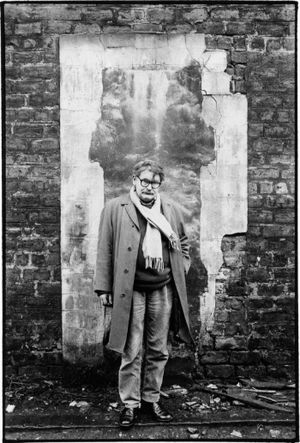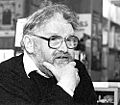Alasdair Gray facts for kids
Quick facts for kids
Alasdair Gray
|
|
|---|---|
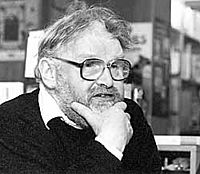
Alasdair Gray in 1994
|
|
| Born | 28 December 1934 Riddrie, Glasgow, Scotland |
| Died | 29 December 2019 (aged 85) Shieldhall, Glasgow, Scotland |
| Occupation | Novelist, artist, playwright, academic, teacher, poet, muralist, illustrator |
| Nationality | Scottish |
| Alma mater | Glasgow School of Art |
| Genre | Science fiction, dystopianism, surrealism, realism |
| Literary movement | Postmodern literature |
| Years active | 1951–2019 |
| Notable works | Lanark: A Life in Four Books 1982, Janine Poor Things The Book of Prefaces |
| Spouse |
Inge Sørensen
(m. 1961; separated 1969)Morag McAlpine
(m. 1991; died 2014) |
| Children | 1 |
| Website | |
| Official website: http://joemurray.me.uk/alasdairgray/ Alasdair Gray Archive |
|
Alasdair James Gray (born December 28, 1934 – died December 29, 2019) was a famous Scottish writer and artist. He was known for his novels, short stories, plays, and poems. He also created his own unique illustrations and designs for his books.
His first novel, Lanark (published in 1981), is considered a very important book in Scottish literature. Alasdair Gray's stories often mixed real-life events with fantasy and science fiction. His work won several awards and inspired many other Scottish writers.
He studied at the Glasgow School of Art from 1952 to 1957. Besides illustrating his books, he painted portraits and large wall paintings called murals. You can still see some of his murals in places like the Òran Mór venue and Hillhead subway station in Glasgow. His art has been shown in many exhibitions and is part of important art collections.
Gray's writing style is called postmodern, which means it often plays with different ways of telling a story. His books sometimes include footnotes that explain the ideas that influenced him. He was also a strong supporter of Scottish independence and socialism. He is famous for the saying, "Work as if you live in the early days of a better nation." This quote is even carved into the wall of the Scottish Parliament Building in Edinburgh.
Contents
Becoming a Writer and Artist
Alasdair Gray was born in Riddrie, a part of Glasgow, Scotland, on December 28, 1934. His father, Alexander, worked in a factory and loved hillwalking. His mother, Amy, worked in a clothing warehouse.
During World War II, Alasdair was moved to different places for safety, including Auchterarder and Stonehouse. For a few years, his family lived in Wetherby, England, where his father managed a hostel for factory workers.
Alasdair loved visiting the public library as a child. He enjoyed stories like Winnie-the-Pooh and comics such as The Beano and The Dandy. Later, the spooky stories of Edgar Allan Poe became a big influence on him.
He went to Whitehill Secondary School in Glasgow. There, he became the editor of the school magazine and won awards for his art and English skills. When he was just eleven, he even read a story on BBC children's radio! He started writing his own short stories as a teenager.
After his mother passed away when he was eighteen, Alasdair enrolled at the Glasgow School of Art. While studying art, he began writing what would become his first novel, Lanark. He finished the first part of the book in 1963, but it was not published until much later.
In 1957, Alasdair Gray finished art school with a degree in Design and Mural Painting. He worked as an art teacher for a few years before focusing more on his art and writing.
Alasdair Gray's Artworks
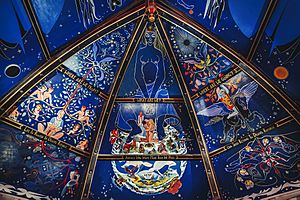
After art school, Alasdair Gray painted backgrounds for plays at the Glasgow Pavilion and Citizens Theatres. He also worked as a freelance artist, meaning he took on different art projects. His first large wall painting was called "Horrors of War."
Many of his early murals have been lost over time. However, you can still see some of his surviving works. These include a mural at the Ubiquitous Chip restaurant in Glasgow and another at Hillhead subway station.
One of his most famous artworks is a huge ceiling mural at the Òran Mór venue in Glasgow. He worked on this mural for several years with another artist, Nichol Wheatley. It shows Adam and Eve under a night sky, with modern people from Glasgow in the front. It is one of the largest artworks in Scotland.
From 1977 to 1978, Gray worked for the People's Palace museum as Glasgow's "artist recorder." He drew hundreds of pictures of the city, including portraits of people and scenes from workplaces. These drawings are now kept at the Kelvingrove Art Gallery and Museum.
Alasdair Gray's paintings and prints are also held in many important collections. These include the Scottish National Galleries, the Tate Gallery, and the Victoria and Albert Museum.
In 2014-2015, a special event called the "Alasdair Gray Season" celebrated his art in Glasgow. This happened around his 80th birthday. The main exhibition, Alasdair Gray: From The Personal To The Universal, was held at the Kelvingrove Art Gallery and Museum and attracted over 15,000 visitors.
Gray once said that writing made him tired, but painting gave him energy. His art often used small, local details to talk about big, universal ideas and themes.
His Famous Books
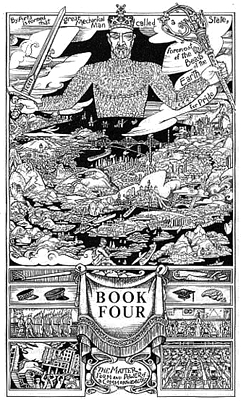
Alasdair Gray's first plays were broadcast on radio and television in 1968. He also joined a writing group in the 1970s with other Scottish writers like James Kelman and Liz Lochhead.
His first novel, Lanark, was finally published in 1981 and received great praise. It became his most well-known book. Lanark has been compared to famous works like Nineteen Eighty-Four by George Orwell because of its themes of official threats. It also uses fabulism, similar to authors like Jorge Luis Borges and Italo Calvino.
Lanark helped to bring new life to Scottish literature and inspired many younger Scottish writers. These included famous authors like Irvine Welsh and Iain Banks. Many people call Lanark "one of the landmarks of 20th-century fiction."
In 1983, his first collection of short stories, Unlikely Stories, Mostly, won the Cheltenham Prize for Literature. This book included short stories Gray had written between 1951 and 1983.
From 2001 to 2003, Gray became a professor of Creative Writing at the University of Glasgow and Strathclyde Universities.
Most of Alasdair Gray's books are set in Glasgow and other parts of Scotland. His writing played a big role in making Glasgow a more important place for literature. His work, especially Lanark, helped to put Scotland back on the literary map and had a strong influence on Scottish fiction for many years.
A unique feature of his books is that he illustrated them himself. He also published three collections of poetry, which, like his fiction, often used humor to explore big ideas like love, God, and language.
His Life in Glasgow
Alasdair Gray married Inge Sørensen, a nurse from Denmark, in 1961. They had a son named Andrew in 1963. They later separated in 1969.
He then married Morag McAlpine in 1991, and they were together until her death in 2014. Alasdair Gray lived in Glasgow for almost his entire adult life.
His Legacy
Alasdair Gray passed away on December 29, 2019, the day after his 85th birthday, after a short illness. He chose to donate his body to science, so there was no funeral.
Many important people paid tribute to him. Nicola Sturgeon, who was the First Minister of Scotland, called him "one of the brightest intellectual and creative lights Scotland has known in modern times." Other famous writers like Ian Rankin and Irvine Welsh also shared their respect. The Guardian newspaper called him "the father figure of the renaissance in Scottish literature and art."
His works and personal items are kept at the National Library of Scotland. In March 2020, the Alasdair Gray Archive was created. This archive is a free resource that looks after Gray's studio and his art and writing materials. It helps people learn about his work and offers educational opportunities. One special event is Gray Day, held every year on February 25, to celebrate his life and works.
See also
 In Spanish: Alasdair Gray para niños
In Spanish: Alasdair Gray para niños
Images for kids


